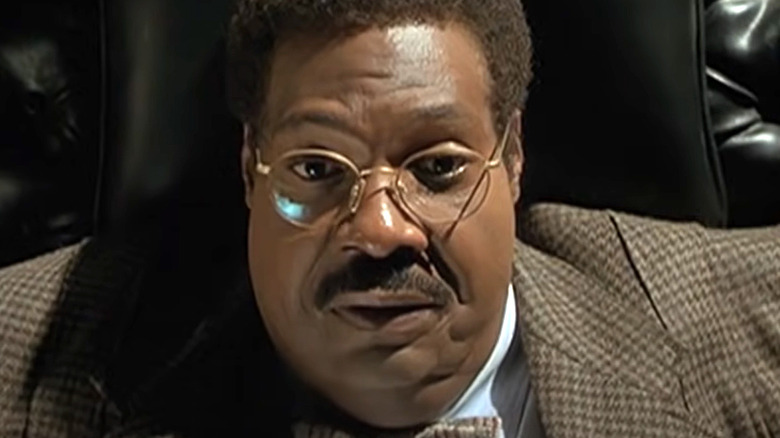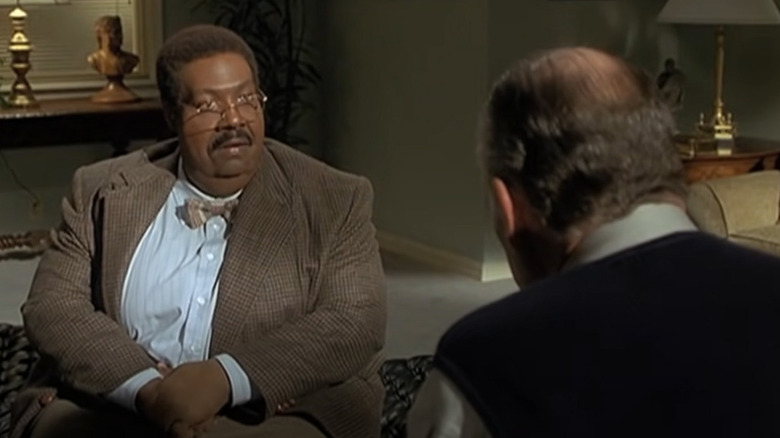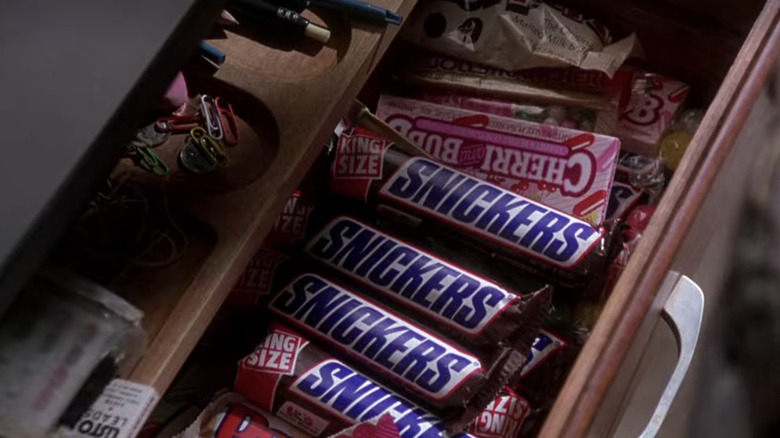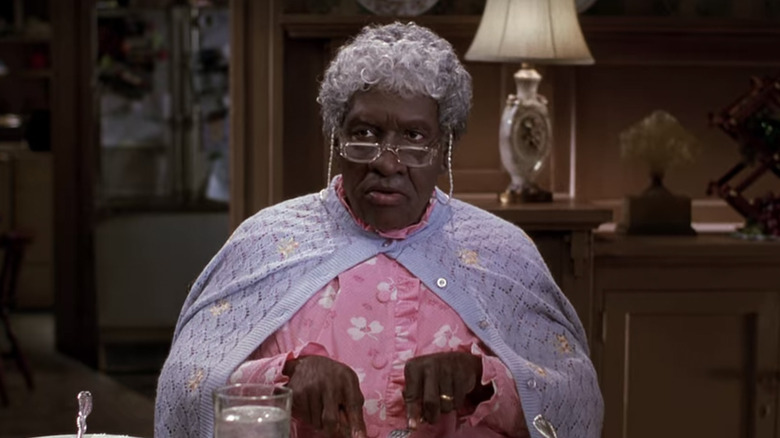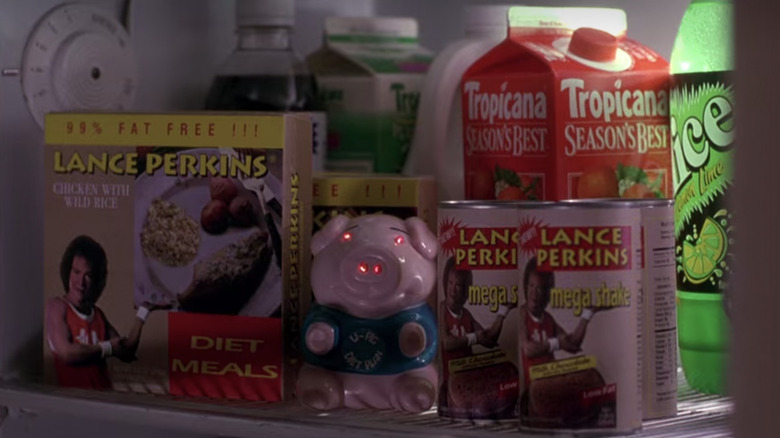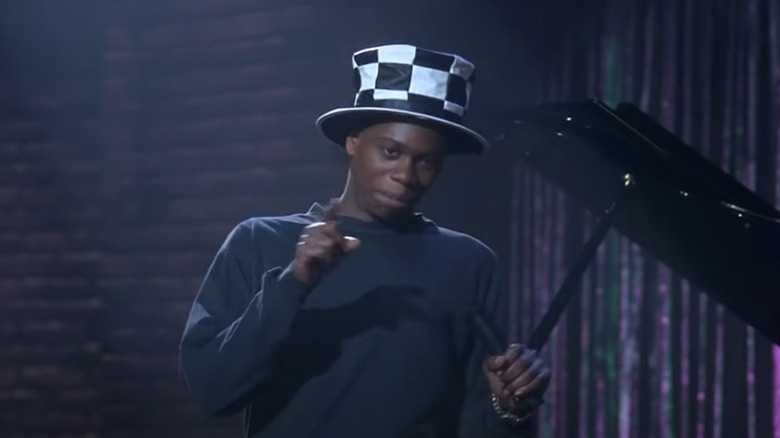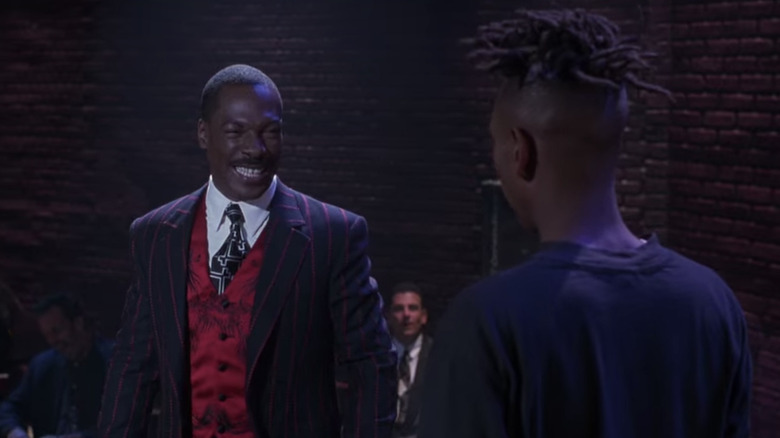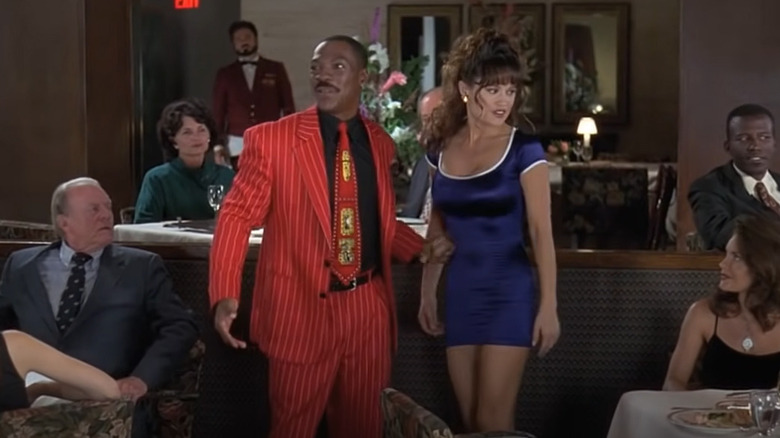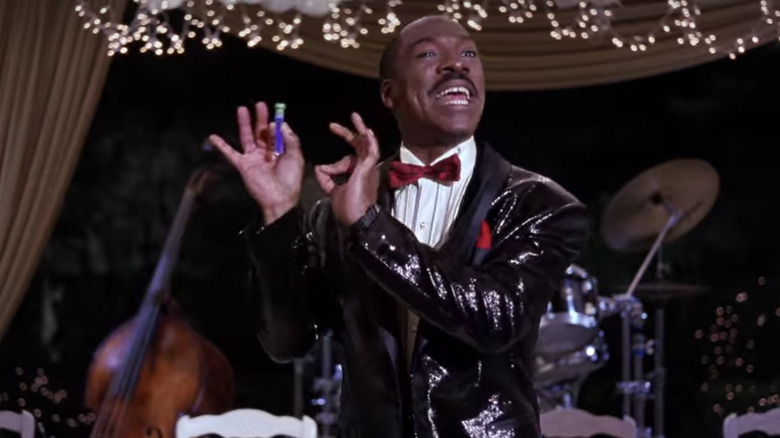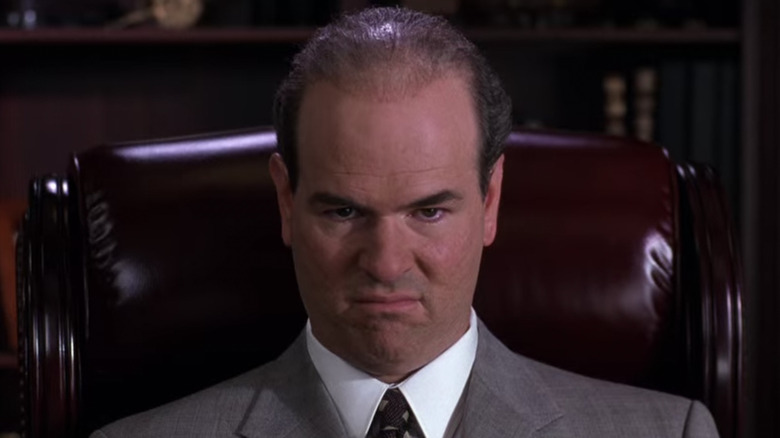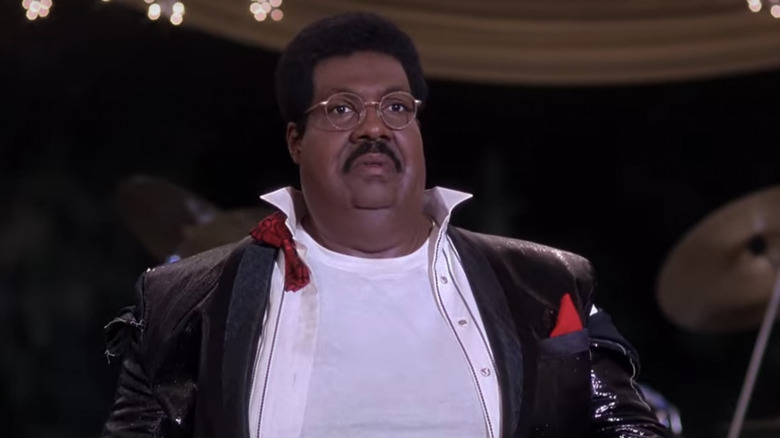Things Only Adults Notice In The Nutty Professor
1996's "The Nutty Professor" stars the one and only Eddie Murphy as Sherman Klump, a kindly scientist who creates a serum capable of slimming people down in the blink of an eye. When Sherman takes the serum (which has been tested on guinea pigs, rather than humans), he becomes a confident, charismatic, and svelte version of himself. Slowly but surely, this alternate version of Sherman, christened "Buddy Love," begins to take over his life, with increasingly disastrous consequences.
Changing humanity's essential make-up never ends well in science fiction, as Sherman eventually learns. Luckily, he manages to clean up the mess he's made of his life, and earn a whole lot of laughs along the way. While viewers of all ages can appreciate this slapstick comedy, there are plenty of elements present that tend to go unnoticed by younger viewers. Here are the jokes, lessons, and references only adults notice in "The Nutty Professor."
There is no one-size-fits-all way to lose weight
One of the biggest themes of "The Nutty Professor" is the struggle to lose weight — often, at all costs. Unfortunately, this isn't always handled sensitively: The film is flooded with body-shaming. Even though he's a brilliant scientist, Sherman believes he's not the man he should be, because of his weight. Thus, he pours his energies into concocting a potion that will cause weight loss.
Many elements of this movie aren't meant to be taken seriously –– it is, after all, a comedy. But many seasoned viewers can't help but notice the futility of Sherman's quest from its outset: He's trying to come up with a one-size-fits-all way to lose weight, which simply doesn't exist. Some people have higher metabolisms than others. Different exercises are best suited to people with different body types. Weight loss is an extremely complicated and individual process, yet Sherman is trying to solve this enigma with a single serum. This is a truth many adults come to know through intimate experience, just like Sherman does by the time the movie ends.
Sherman's relationship with food is deeply complicated
Sherman can't seem to stop overeating. This trait lands very differently with adults than kids: Older viewers quickly deduce that the scientist copes with his problems by eating. He just can't help himself — or at least, not all the time. This is made obvious by the cache of hidden snacks he has in his teaching desk. It's framed as comedic, but many adults will recognize it as a sign of serious distress.
Sherman's struggles are further highlighted by the destructive phases he goes through. He follows an exercise routine and eats healthier when he's happy, but when negativity strikes his life, as when a comedian makes fun of him on his date with Carla Purty (Jada Pinkett Smith), he reverts to his old habits. Luckily, mental health awareness has come a long way since the '90s, when it was more acceptable to shame someone for their weight. Today, many adults recognize that Sherman doesn't have a problem with "willpower" — he's attempting to cope with his problems in a specific and understandable way. The solution isn't rapid weight loss, it's compassionate care.
Eddie Murphy plays seven different characters
No matter what people think of "The Nutty Professor," one thing remains true: Eddie Murphy's comedic genius is on full display within this movie. Murphy plays not one, not two, not five, but seven characters in this film. Younger fans might catch on to two or three of his roles, but only adult viewers are likely to notice every single performance.
In addition to playing Sherman and his alter ego Buddy Love, Murphy plays Sherman's father (Papa Klump), mother (Mama Klump), grandmother (Grandma Klump), and brother (Ernie Klump Sr.) That's right: The Klump family is an all-Murphy affair. Murphy is very much talking to himself during scenes in which the entire family sits down and enjoys a meal. That said, Murphy doesn't play Sherman's nephew, Ernie Klump Jr., who is portrayed by Jamal Mixon.
Kids are least likely to notice Murphy's seventh character, Lance Perkins. He's a parody of Richard Simmons, a fitness instructor who rose to fame in the late '80s with his "Sweatin' to the Oldies" videos.
Crash diets and fads don't work
As audience members of any age will notice, the underlying theme of "The Nutty Professor" is the struggle to lose weight. Yet younger minds might not be able to recognize a truth at the heart of the story: Crash diets and fads typically don't work. Despite Sherman's status as an intelligent scientist, he can't help himself from being drawn to these weight-loss schemes. That's because the people who pump crash diets into the universe tend to prey on people's insecurities, and sadly, they're very good at what they do.
Sherman has a fridge full of products he purchased from fitness guru Lance Perkins, a man he routinely watches on TV for motivation and strength. This is just one aspect of Sherman's effort to slim down — he will seemingly do anything to lose weight, from partaking in bizarre food regimens to giving acupuncture a try. Unfortunately, many crash diets can cause more harm than good. Moreover, people tend to gain back any weight they manage to lose once they go off the diet in question. Sherman probably knows this, but again, weight loss is complicated. It's not always as simple as having willpower or knowledge, especially in a world full of snake oil salesmen.
Dave Chappelle plays the comedian on Sherman's date
Although younger audience members might not notice him, Dave Chappelle plays Reggie Warrington, the comedian who performs during Sherman and Carla's date. When "The Nutty Professor" was released, most people probably didn't look twice at him. But a handful of years later, Dave Chappelle firmly established himself as one of the most important comedians of all time.
Chappelle broke into the public consciousness when his legendary sketch comedy series, "Chappelle's Show," hit the airwaves in 2003. Although Reggie Warrington might have gone unnoticed by children and adults alike in 1996, an older viewer will immediately recognize him when revisiting the movie in the modern day. Looking back, it's pretty amazing that two comedic legends share space in this film. They even go back and forth in a later scene, when Buddy Love attempts to out-perform Reggie from his seat in the audience.
Buddy Love is anything but child-friendly
Though Buddy Love has his moments of genuine charm, his use of profanity and womanizing nature make him a pretty inappropriate character for kids to watch. Sure, a lot of it probably goes over their heads, but an adult still cringes when they remember that Buddy beds three different nameless women in a later scene. A good majority of the movie is still suitable for younger audience members, but Buddy Love's antics remind us all that "The Nutty Professor" is, in fact, a PG-13 movie.
Making people laugh excuses a lot of bad behavior — especially in '90s movies with attitudes that haven't aged well. Unfortunately for Sherman, the magnetic Buddy still manages to get him into a whole lot of trouble. In time, Sherman loses virtually everything he loves and cares about because of Buddy's demeanor — we even see an eviction notice resting against his door in one scene. Luckily, it all works out in the end, and Buddy Love does provide great entertainment along the way. But an adult might still want to keep the mute button handy if they're watching this with little ones.
The Nutty Professor was ahead of its time in its portrayal of toxic masculinity
The term "toxic masculinity" has entered the mainstream over the last few years. In a nutshell, it refers to cultural pressures put upon men to behave in an aggressive and tough manner (via The New York Times). Modern adults who revisit "The Nutty Professor" will immediately recognize that this movie was pretty ahead of its time in its portrayal of this societal force.
Sherman's serum doesn't ultimately work because it raises testosterone levels to absurd and unhealthy heights. That's right: This masculinity is literally toxic. This causes Buddy Love to become abrasive, overly assertive, egotistical, and an all-around jerk. His testosterone level is the only measure that is portrayed as being out of whack, which underlines its connection to his flaws. Toxic masculinity might not have been as popular a phrase in the '90s as it is today, but the creators of "The Nutty Professor" were clearly tuned in to its message.
Being thin doesn't make you a good person
Sherman appears to have everything he could possibly ask for. He has a good job working for a university, intelligence in spades, a loving family, and he's dating the girl of his dreams. Yet the one thing he really wants –– to be thin –– remains out of his reach. As he'll come to learn, being skinny doesn't make you a worthwhile person. In fact, he already very much is that person. Sherman is compassionate, kind, and patient, while Buddy is perverted, over-confident, and rude. But Buddy is also thin, and for a while, that's all that matters to Sherman.
Many adults have already learned this lesson the hard way. When you're young, however, the desire to conform to what the world wants from you is blinding. But being kind and good at your job matters so much more than what you look like — a fact made clear when Sherman is rehired, and businessman Harlan Hartley (James Coburn) donates to the school. "The Nutty Professor" ultimately comes to rest on the message that looks are only one small part of a person, and that someone's true gifts are found within. Kids might find this cheesy, but their parents know how true it really is.
Why does Sherman continue to work for the university?
Sherman's boss, Dean Richmond (Larry Miller), is an absolute nightmare to work for. Luckily, Harlan Hartley is invested in Sherman, not the school that employs him. This raises an important question: Why does Sherman continue to work for the university?
We're not trying to pick any nits here, but any adult familiar with the working world can't help but wonder why he sticks around. Sherman is absolved of his crimes by the end of the movie, and is free to work wherever he wants. Sure, things got out of hand, but he created a serum that makes people lose weight immediately. While the university might own the rights to this serum, he's clearly a world-defining scientist. Moreover, his boss isn't going to suddenly become a nice person. With his skills and Harlan's funding, Sherman could probably go anywhere he desires — and should. As seasoned viewers know, working for a bad boss can rip the joy out of even the most fulfilling job. Someone as highly sought-after as Sherman should have a plethora of options far away from Dean Richmond at this disposal. There's no reason not to take one.
But seriously, shouldn't Sherman go to jail?
Because Harlan's donation to the school is specifically tied to Sherman's work, Dean Richmond ultimately rehires him. However, that doesn't take away from the fact that Sherman, as Buddy Love, spent university money on personal luxury items. We're not talking take-out — Buddy bought a sports car on the school's dime.
That's really only the tip of the iceberg, too: Sherman is threatened with eviction, lies to tons of people in a professional and personal context, and uses research done at the school for immense personal gain. Somewhere in there, legal, scientific, and moral codes are being broken. One would think Sherman would spend some time in jail, or at least face some sort of legal action. Yet because this film is sprinkled with movie magic, Sherman gets off scot-free and ends things on a pleasant note. Kids won't blink at this, but adults will be thrown for a loop at just how much gets swept under the rug.
